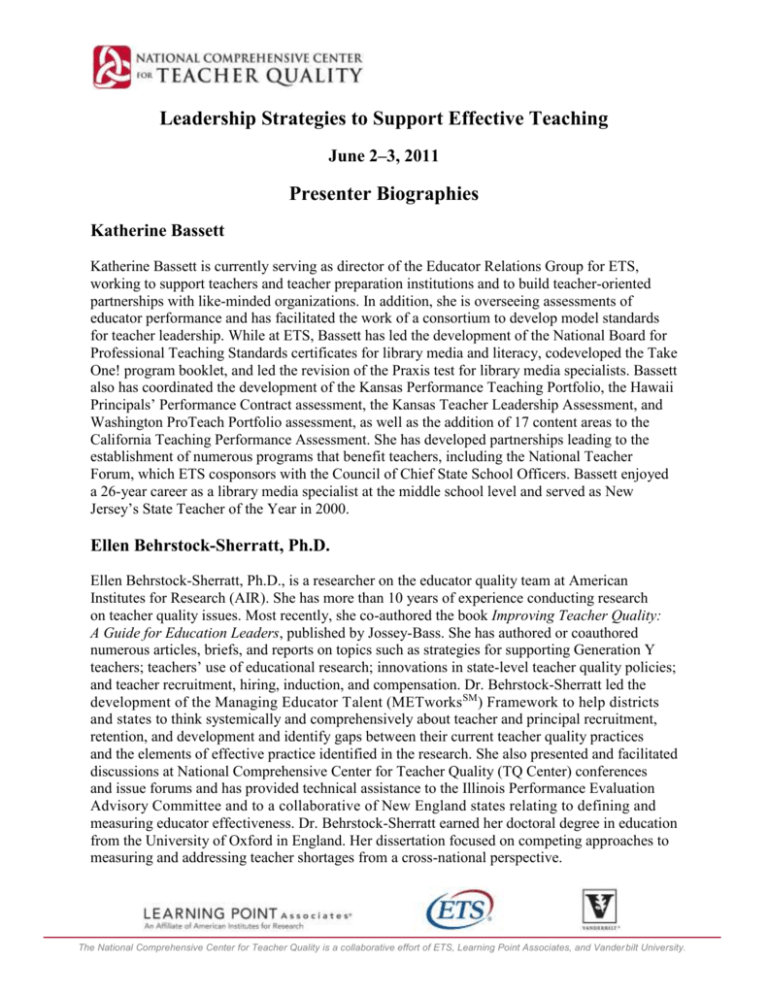Leadership Workshop Bios - Center on Great Teachers and Leaders
advertisement

Leadership Strategies to Support Effective Teaching June 2–3, 2011 Presenter Biographies Katherine Bassett Katherine Bassett is currently serving as director of the Educator Relations Group for ETS, working to support teachers and teacher preparation institutions and to build teacher-oriented partnerships with like-minded organizations. In addition, she is overseeing assessments of educator performance and has facilitated the work of a consortium to develop model standards for teacher leadership. While at ETS, Bassett has led the development of the National Board for Professional Teaching Standards certificates for library media and literacy, codeveloped the Take One! program booklet, and led the revision of the Praxis test for library media specialists. Bassett also has coordinated the development of the Kansas Performance Teaching Portfolio, the Hawaii Principals’ Performance Contract assessment, the Kansas Teacher Leadership Assessment, and Washington ProTeach Portfolio assessment, as well as the addition of 17 content areas to the California Teaching Performance Assessment. She has developed partnerships leading to the establishment of numerous programs that benefit teachers, including the National Teacher Forum, which ETS cosponsors with the Council of Chief State School Officers. Bassett enjoyed a 26-year career as a library media specialist at the middle school level and served as New Jersey’s State Teacher of the Year in 2000. Ellen Behrstock-Sherratt, Ph.D. Ellen Behrstock-Sherratt, Ph.D., is a researcher on the educator quality team at American Institutes for Research (AIR). She has more than 10 years of experience conducting research on teacher quality issues. Most recently, she co-authored the book Improving Teacher Quality: A Guide for Education Leaders, published by Jossey-Bass. She has authored or coauthored numerous articles, briefs, and reports on topics such as strategies for supporting Generation Y teachers; teachers’ use of educational research; innovations in state-level teacher quality policies; and teacher recruitment, hiring, induction, and compensation. Dr. Behrstock-Sherratt led the development of the Managing Educator Talent (METworks SM) Framework to help districts and states to think systemically and comprehensively about teacher and principal recruitment, retention, and development and identify gaps between their current teacher quality practices and the elements of effective practice identified in the research. She also presented and facilitated discussions at National Comprehensive Center for Teacher Quality (TQ Center) conferences and issue forums and has provided technical assistance to the Illinois Performance Evaluation Advisory Committee and to a collaborative of New England states relating to defining and measuring educator effectiveness. Dr. Behrstock-Sherratt earned her doctoral degree in education from the University of Oxford in England. Her dissertation focused on competing approaches to measuring and addressing teacher shortages from a cross-national perspective. The National Comprehensive Center for Teacher Quality is a collaborative effort of ETS, Learning Point Associates, and Vander bilt University. Kietha Biggers Kietha Biggers is a senior research assistant at ETS. Her work focuses on projects related to measuring teacher effectiveness, teacher evaluation, and professional development. Prior to joining ETS, Biggers was a senior program director with the Princeton Center for Leadership Training working in schools and districts throughout New Jersey to facilitate professional development programs for teachers and administrators. Her work emphasized how teacher practice and a positive school climate can support higher academic outcomes and a reduction in health-risk behaviors among students. Before entering the field of education, Biggers was a corporate training manager dedicated to employee growth and development. Gina Burkhardt Gina Burkhardt is executive vice president of AIR, one of the largest behavioral and social science research organizations in the world. AIR, a not-for-profit organization, conducts and applies research in the areas of education, health, international development, and work and training to improve people’s lives and well-being, with a special emphasis on the disadvantaged. As director of AIR’s Education, Human Development, and the Workforce division, Burkhardt is responsible for 450 employees. Previously, she was chief executive officer of Learning Point Associates, a nonprofit education research and consulting organization that merged with AIR in August 2010. Burkhardt’s expertise includes leadership, organizational development and systems change, district and school improvement, and policy research. She is a member of the board of directors for Editorial Projects in Education, which publishes Education Week. She also serves on the boards of the Partnership for 21st Century Skills and the Knowledge Alliance. She completed her doctoral coursework in educational psychology at the University of North Carolina at Chapel Hill. Nínive Calegari Nínive Calegari is the founder of The Teacher Salary Project, former chief executive officer and cofounder of 826 National, and cofounder of 826 Valencia. She is a veteran teacher with 10 years of classroom experience in urban and suburban public high schools that spans work in Mexico to San Francisco’s first charter school, Leadership High School. While at Leadership High School, she served on the board of directors and encountered many teachers and stories, which would lead her to coauthor the book Teachers Have It Easy: The Big Sacrifices and Small Salaries of America’s Teachers. Calegari was the recipient of Edutopia’s 2007 Daring Dozen award and was appointed to the San Francisco Arts Commission in the spring of 2008. In addition, she is the coproducer of the recently released documentary American Teacher. She earned her master’s degree in teaching and curriculum from Harvard University’s Graduate School of Education. Matthew Clifford, Ph.D. Matthew Clifford, Ph.D., is a senior research scientist at AIR. Dr. Clifford has more than 10 years of experience as a researcher, evaluator, and policy consultant on issues pertaining to school leadership and school principal quality. He currently manages multiple research and evaluation projects for AIR, totaling $1.5 million. Evaluation projects include large-scale, mixed methods evaluations of turnaround principal professional development programs in Florida and 2—Leadership Strategies to Support Effective Teaching: Presenter Biographies TQ Center Mississippi and three evaluations of school districts’ alternative certification programs. His research focuses on documentation and improvement of school leadership practice, and he has published extensively on distributed leadership practice. Currently, he is developing and validating a school leadership formative assessment for the U.S. Department of Education and is conducting a multicase study on how leaders acquire and use research in policymaking for the William T. Grant Foundation. Jack Dale, Ed.D. Jack Dale, Ed.D., is the superintendent of Fairfax County Public Schools (FCPS), the nation’s eleventh largest school system. He joined FCPS as superintendent in 2004. Previously, he served as superintendent of Frederick County Public Schools, where he was named Maryland’s superintendent of the year. He has served in education as a teacher of mathematics, assistant principal, director of instruction, director of personnel, and associate superintendent for school administration. One of Dr. Dale’s major initiatives in Fairfax County is the Teacher Leadership initiative, which provides extended-year teacher contracts designed to improve instruction, thereby raising student achievement. The initiative also provides FCPS Leadership Team members the opportunity to cultivate talent within the division and to ensure that only effective programs and practices are implemented. Dr. Dale is active in professional associations, serving as president of the Washington Area School Superintendent’s Study Council in 2003–04. He also is a member of the American Association of School Administrators, ASCD, the National School Board Association, and other local professional associations and boards. He is well-regarded for his advocacy for international education and has received the Hispanic Leadership Alliance 2007 Leader of the Year Award and the World Affairs Council 2009 Global Education Leader Award. Dr. Dale is co-editor and author of Creating Successful School Systems and has conducted workshops on teacher compensation systems for No Child Left Behind initiatives. He holds a master’s degree in educational administration and a doctorate in education, with an emphasis on school leadership and organizational change, from the University of Washington. Troyce Fisher Troyce Fisher is the director of cohesive leadership system development at the School Administrators of Iowa. Prior to serving in this capacity, she was the executive director of the School Administrators of Iowa, a clinical professor in Iowa State University’s educational administration program, and a consultant and then administrator in one of Iowa’s intermediate service agencies. She began her career in education as a high school social studies teacher. This is her 40th year in education. Her professional areas of interest include change leadership and innovation, systems thinking, and the impact of culture on system improvement. Dr. Fisher is a past recipient of the Iowa Administrator of the Year award from the Iowa Counseling Association, the central office administrator of the year award from the School Administrators of Iowa, and the Robert D. Ray Pillar of Character award from the Institute for Character Development. She recently authored an article in the Journal of Staff Development (April/May 2010) titled “Developing School Leaders Means Addressing All Parts of the System.” The work to create a cohesive leadership system in Iowa was cited by the RAND Corporation’s independent evaluation as one of the three best in the country. She earned her master’s degree from the University of Northern Iowa and her specialist and doctorate degrees from Drake University. TQ Center Leadership Strategies to Support Effective Teaching: Presenter Biographies—3 Alyssa Ford-Heywood Alyssa Ford-Heywood is a ten-year employee with the Pittsburgh Public Schools. She currently serves as the project manager for the Pittsburgh Principal Incentive Program. In her role as the project’s primary liaison, she is responsible for coordinating the district’s various systems to support the components related to principal evaluation and compensation for the Pittsburgh Public Schools. Ford-Heywood’s work in education spans more than 15 years and includes work in early childhood development, postsecondary preparation, and parent advocacy. She is committed to understanding the complex issues of education, and through her work, she demonstrates the importance of effecting positive educational change for all learners. FordHeywood holds a master’s degree in education, and she is currently a doctoral candidate at Indiana University of Pennsylvania where she is exploring topic interests related to principal leadership and its impact on changing school culture in a way that increases student achievement. Kathleen Fulton Kathleen Fulton is the director of Reinventing Schools for the 21st Century at the National Commission on Teaching and America’s Future (NCTAF). Fulton is the creator and project director of NCTAF’s Teachers Learning in Networked Communities® (TLINC) project, funded by the U.S. Department of Education, and TLINC 2.0, funded by Qualcomm to support the use of mobile technologies in teacher preparation. She is principal investigator for NCTAF’s NASA 21st Century Learning Teams project and has served as a lead author for a number of NCTAF’s recent reports, including No Dream Denied: A Pledge to America’s Children (2003); Induction Into Learning Communities (2005); Team Up for 21st Century Teaching and Learning (2010); and STEM Teachers in Professional Learning Communities: A Knowledge Synthesis (2010). Before joining NCTAF, Fulton was project director for the Congressional Web-based Education Commission and lead author of its report The Power of the Internet for Learning. Previous positions include associate director of the Center for Learning and Educational Technology at the University of Maryland and policy analyst for the U.S. Congressional Office of Technology Assessment (OTA). At OTA, she was the project director responsible for two major education reports: Education and Technology: Future Visions and Teachers and Technology: Making the Connection. She earned her master’s degree in human development from the University of Maryland. Steven Gilhuley Steve Gilhuley is the principal of Howard T. Herber Middle School in the Malverne School District in Malverne, New York. Gilhuley has been at Howard T. Herber for the past seven years, having served for three years as assistant principal and the last four years as principal. Previously, Gilhuley worked in Hicksville and Sewanhaka School Districts. Recently, Gilhuley was named a 2011 Champions of Character award recipient by the Sage Colleges. This award is given annually to those who clearly exhibit positive character traits, such as civility, respect, selfdiscipline, and excellence, in their habits and performance. In addition, Gilhuley received the WLNYH-TV Educator of the Week in 2007 and the 2006 Educator of the Year Award from the Phi Delta Kappa Hofstra University Chapter. He was also the author of Howard T. Herber’s successful NCLB Blue Ribbon School of Excellence application in 2005. Gilhuley has been 4—Leadership Strategies to Support Effective Teaching: Presenter Biographies TQ Center trained and mentors teachers in supportive supervision, a process to improve instruction and academic performance. He has presented workshops to teachers on lesson planning, behavior management, and raising expectations of all students. He earned his master’s degree in special education from C.W. Post University. Lynn Holdheide Lynn Holdheide is a research associate at Vanderbilt University. She works on several TQ Center projects related to improving the preparation of teachers for students with at-risk characteristics and disabilities. Holdheide coordinates the TQ Connection, an online resource designed to serve both general and special education teacher preparation. Her work also addresses response to intervention, inclusive services, and effective teaching practices. Previously, Holdheide was a project coordinator and education consultant for nine years at the Indiana Department of Education, Division of Exceptional Learners. She served as the school-towork transition consultant and directed a statewide study collecting postschool outcome data for students with disabilities. Data from this study were used to develop a statewide system to measure employability skills, modify curriculum, and direct state transition policy. Holdheide has experience as a teacher, transition specialist, vocational specialist, and residential provider. She earned her master’s degree from Eastern Illinois University. Marguerite Izzo Marguerite Izzo, whose teaching career spans more than 30 years, is a full-time fifth-grade teacher, specializing in English language arts, at Howard T. Herber Middle School in the Malverne School District, located on Long Island, New York. She also serves as an adjunct faculty member in the Adelphi literacy education program, teaching graduate-level students. Izzo is the 2007 New York State Teacher of the Year and a member of the New York State Teachers of the Year Council, presenting workshops at state and national conferences and working to expand the role of the New York State Teacher of the Year. She was the teacher representative for the U.S. delegation at the International Summit on the Teaching Profession. She has served on the New York Regents Standards Steering Committee, providing the voice of the practitioner as new state learning standards are being developed. As the codirector of the Malverne Teacher Center, Izzo provides professional development workshops and courses for the teachers in the Malverne School District. She is responsible for writing the annual grant for funding and the operation of the four district Teacher Center satellites. She is a member of the ETS Teacher Leadership Standards Committee, the foundation officer of the Adelphi Phi Delta Kappa chapter, and a member of the Adelphi University Alumni Association Board. In addition, she mentors novice teachers in her district. She holds a master’s degree in elementary education from Adelphi University. Joellen Killion Joellen Killion is deputy executive director of Learning Forward, formerly the National Staff Development Council. In this position, she focuses on improving professional learning for all educators. She leads many of Learning Forward’s initiatives related to standards for professional learning, state and school system comprehensive planning for professional learning to increase TQ Center Leadership Strategies to Support Effective Teaching: Presenter Biographies—5 student achievement, instructional coaching, and evaluation of professional development. She is a frequent contributor to Learning Forward’s publications. Her three books, What Works in the Middle, What Works in the Elementary Grades, and What Works in the High School, summarize two-year studies of content-specific (social studies, science, mathematics, and language arts) professional development. Her study of schools that have received the U.S. Department of Education’s Model Professional Development Awards sponsored by the U.S. Department of Education and WestEd resulted in Teachers Who Learn, Kids Who Achieve: A Look at Model Professional Development. She recently conducted a study of online learning and its role in professional development. This study resulted in E-Learning for Educators: Implementing the Standards and PDK’s EDge, The Changing Face of Professional Development (May 2011). Killion’s other books include Assessing Impact: Evaluating Staff Development (2nd ed.), Collaborative Professional Learning Teams in School and Beyond: A Tool Kit for New Jersey Educators; Taking the Lead: New Roles for Teacher and School-Based Coaches; The Learning Educator: A New Era in Professional Learning; and Becoming a Learning School. Steve Kimball, Ph.D. Steve Kimball, Ph.D., is an assistant scientist with the Consortium for Policy Research in Education (CPRE) and the Value-Added Research Center (VARC) within the Wisconsin Center for Education Research (WCER) at the University of Wisconsin–Madison. Dr. Kimball’s work with the CPRE Teacher Compensation Project includes research and dissemination on standardsbased teacher evaluation and compensation reforms. He was also the co-principal investigator of a 2005–2007 study funded by the Institute of Education Sciences on performance evaluation of principals. He is currently working on the Integrated Resource Information Systems (IRIS) project in Milwaukee Public Schools, which seeks to capture and analyze new data on school use of resources and educator professional development. He is completing a study of human capital management practices in a large, urban district as part of the CPRE Strategic Management of Human Capital project. Dr. Kimball is also leading a technical assistance team for the Wisconsin Department of Public Instruction Educator Effectiveness Design Team, which is developing frameworks for teacher and principal evaluation. In his work with VARC, he is part of the technical assistance team for the U.S. Department of Education Teacher Incentive Fund. In this capacity, he supports grantees on teacher and principal evaluation and compensation issues as well as program evaluation. Finally, Dr. Kimball is principal investigator for the evaluation of the Chicago Community Trust Education Program. Before completing his graduate studies, he held legislative analyst positions in the U.S. House of Representatives, the U.S. Senate, and the Texas State Office in Washington, D.C. He holds a Ph.D. from the University of Wisconsin– Madison Department of Educational Leadership and Policy Analysis. Gary Kipp Gary Kipp is the executive director of the Association of Washington School Principals (AWSP). In this role, he has contributed to the creation of the Washington State Leadership Academy, a public/private partnership supporting the professional development of principals and superintendents in the state. Kipp serves on the state’s advisory committee for teacher and principal evaluation—a three-year pilot project to transform teacher and principal evaluation in Washington State. In this capacity, he has led the creation of a new structure for principal 6—Leadership Strategies to Support Effective Teaching: Presenter Biographies TQ Center evaluation. He served as an advisor to the Paul Allen Foundation in the development of Success at the Core, a video-based project to support principals in the creation of school leadership teams focused on instruction. Success at the Core is a free Internet product that principals use to improve teaching in their schools. Prior to his work with AWSP, Kipp served two years as an assistant superintendent in the Evergreen School District, twenty years as a high school principal, and five years as a middle school assistant principal in the Longview School District. He has served as adjunct faculty for Seattle Pacific University, the University of Portland, and Pacific Lutheran University. Kipp has been appointed to various state boards as well as the National Merit Scholarship Advisory Board. Elizabeth Kirby Elizabeth Kirby is the principal at Kenwood Academy High School. She graduated from Harvard in 1994 and worked as a center director with the Higher Achievement Program in Washington, D.C. After moving to Chicago in the fall of 1995, she taught at Olive Harvey Middle College, an alternative school for students who dropped out or were expelled from Chicago Public Schools, as well as Triumphant Charter School. She was awarded a James Madison Fellowship in 1998 and studied constitutional history at Georgetown University. In 1999, she began her career at Kenwood Academy as a history teacher, winning a Golden Apple Award during her second year at Kenwood. A member of the second cohort of New Leaders for New Schools, Kirby worked as an assistant principal at Kenwood from 2003 to 2005 and became the principal in July of 2005. In 2008, she received an award from New Leaders for New Schools for service in leadership as the principal of Kenwood Academy and an award for service in education from the Southeast Chicago Commission in 2009. She holds a master’s degree in arts and social science from the University of Chicago. TQ Center Leadership Strategies to Support Effective Teaching: Presenter Biographies—7 Richard Laine Richard Laine is the director of education for The Wallace Foundation and leads the Foundation’s national initiative aimed at strengthening the ability of education leadership—both in terms of the quality of the leaders and the conditions within which they work at the school, district, and state levels—to improve student achievement. Prior to joining the Foundation, Laine headed the Illinois Business Roundtable’s (IBRT) education efforts. Prior to his work at IBRT, he spent more than four years with the Illinois State Board of Education as the associate superintendent for Policy, Planning, and Resource Management. Laine has published numerous articles on whether money matters in education. He recently completed more than four years of service as an elected school board member in which he helped create a performance pay system for district administrators and successfully negotiated a new contract with the teachers union. Laine earned his M.B.A. from the Graduate School of Business, M.P.P. from the Graduate School of Public Policy Studies, and Certificate of Advanced Studies in Education Policy from the University of Chicago. Sabrina Laine, Ph.D. Sabrina Laine, Ph.D., is the director of the TQ Center and vice president, Education Human Development and the Workforce, at AIR. In addition, she is a principal investigator for the Center for Educator Compensation Reform. Dr. Laine has a diverse background in educational policy research and has spearheaded efforts to contribute to policy research and resource development related to every aspect of managing and supporting educator talent including recruitment, compensation, evaluation, distribution, and professional development. She is skilled in working closely and effectively with local, state, regional, and federal education agencies and leads a team of more than 20 researchers and policy analysts who are focused on the challenges faced by educators in urban, rural, and low-performing schools. Dr. Laine has worked for the last several years to ensure that policies and programs are in place that enable all children to have access to highly qualified teachers and leaders. She is the primary author of the new book, Improving Teacher Quality: A Guide for Education Leaders, published by Jossey-Bass in 2011, and is a frequent presenter in states and districts across the country on topics ranging from ensuring teacher effectiveness to equitable teacher distribution. Dr. Laine earned her doctorate in educational leadership and policy studies from Indiana University. Gary Manford Gary Manford is the technical assistance liaison for the Mid-Continent Comprehensive Center (MC3) at the Kansas State Department of Education (KSDE) in Topeka, Kansas. He provides technical assistance to support initiatives identified collaboratively by both programs to achieve the goals of KSDE and the Elementary and Secondary Education Act (ESEA). As the MC3 technical assistance liaison, he develops the capacity of KSDE to support districts and schools in the implementation of ESEA including state and federal programs, special education services, school improvement, assessment, innovation, career and college readiness, teacher education, and leadership. His 40-year career includes experience as a teacher, principal, director of special education, director of federal programs, and director of curriculum in Illinois, Kansas, and Missouri. Most recently, he was the assistant director of the Leadership Academy, overseeing the 8—Leadership Strategies to Support Effective Teaching: Presenter Biographies TQ Center administrative leadership development work from preparation to mentoring, professional development, and performance evaluation for the Missouri Department of Elementary and Secondary Education. During that time, he was the primary author and director of The Wallace Foundation’s State Action for Education Leadership Project. Carolyn McKinney Carolyn McKinney serves as the executive director of the North Carolina Professional Teaching Standards Commission. She came to this position four years ago after 25 years of classroom experience and six years as the president/vice president of the North Carolina Association of Educators (NCAE). McKinney’s classroom experience includes teaching preschool and first grade in Guilford County and second and third grade at Kernersville Elementary School. From 1995 to 1999, she was the mathematics teacher at Sedge Garden School of Mathematics and Science. She embedded professional development for the entire faculty during the school day. It focused on cognitively guided instruction: how children think and learn mathematics. Her service on commissions and committees includes the Professional Teaching Standards Commission, the North Carolina Teacher Academy, the Governor’s Teacher’s Advisory Committee, the Science Math Technology Center Board, the North Carolina Public School Forum, the North Carolina Teacher Working Conditions Advisory Board, and the NCAE Board of Directors. She earned her master’s degree in elementary education from Gardner-Webb University. Tricia Miller, Ph.D. Tricia Miller, Ph.D., is deputy director of the TQ Center. In this position, she coordinates the TQ Center’s work to build the capacity of regional comprehensive centers and states to design and implement systemic education reform to improve the quality and effectiveness of teachers and leaders. Dr. Miller also works on other projects within the Education, Human Development, and the Workforce division at AIR focused on the creation and implementation of effective policy and practice regarding teacher evaluation, preparation, and compensation reform. Previously, she was director of the Teaching Quality and Leadership Institute at the Education Commission of the States where she created and managed work related to the preparation, support, and compensation of effective teachers and leaders. She also has worked as a senior research analyst at the State Higher Education Executive Officers organization, where she developed experience and expertise in issues of teacher preparation and professional development. She earned a doctorate in counseling and educational psychology, with a specialty area in consultation, from the University of Nevada–Reno. Carol Riley Carol Riley is an advocate for elementary and middle school principals in the areas of professional development and outreach for leadership program initiatives at the National Association of Elementary School Principals (NAESP). She also directs the National Mentor Certification Program. She has been a principal for 14 years in both rural and suburban school districts in Ohio. She also has been an administrative director of curriculum and instruction for four local school districts and was an elementary supervisor for 46 elementary schools. Riley has taught for a total of 12 years in first, second, third, and sixth grades on the island of Guam, in TQ Center Leadership Strategies to Support Effective Teaching: Presenter Biographies—9 Texas, and in Ohio. She is a past president of the Ohio Association of Elementary School Principals, the Ohio NAESP affiliate. Riley also has been an adjunct professor of graduate reading courses and has been reviewer for a Reading Text Skill series published by Merrill. In addition, Riley worked with the Maryland Association of Elementary School Principals to begin a nonprofit foundation. Darwin Spiller Darwin Spiller is in his eighth year as principal of Stults Road Elementary School. He began his career with the Richardson Independent School District at Stults Road Elementary in 1997 as a sixth grade teacher. Darwin was recently named a finalist by the Texas Elementary Principals & Supervisors Association (TEPSA) along with 12 other principals in Texas as the “Best of the Best” of Texas principals. In addition, he serves as a standing committee member with the Marketing and Research Division of TEPSA and National Association of Elementary School Principals (NAESP) among numerous others. As a result of Stults Road Elementary being recently named the 2010–11 National Title I Distinguished School, Darwin has been selected as a Texas state representative for a new statewide parental involvement initiative in conjunction with the Texas Education Agency. Spiller recently authored an article titled “Stults Road Elementary PLC’s Journey: An Overview,” which was posted and published by Solution Tree, as well as his recently published article “Distinguished Now” with ASCD. His latest project is a collaborative effort with schools in Australia to help implement the PLC Framework. Spiller earned his master’s degree in educational leadership and policy studies from the University of Texas at Arlington. Cheryl Watkins Cheryl Watkins is founding principal of John H. Pershing West Middle School, a Performance Model School of the Renaissance 2010 program. In 2005, along with four others, she wrote a proposal to start a new school. In that time, she has facilitated the personal and professional growth and development for students, teachers, and parents. She is an advocate for bringing issues that affect teaching and learning to the forefront. Watkins is an active member of Advance Illinois, an organization seeking to assist schools to better prepare students for college, work, and life. She also serves as second vice-chair of the Golden Apple Academy of Educators. She has been the recipient of numerous awards for excellence in teaching, including the Golden Apple Award (for Excellence in Teaching), the Kathy Osterman Award for Superior Public Service, and the Michael Jordan Education Club Teacher Achiever Award. In 2008, she was one of two recipients of the Milken Educator Award for the state of Illinois. Her educational interests include teacher and paraeducator preparation, cultural language and its effect on literacy, supporting the teaching and learning of individuals with disabilities, and advancing the teaching profession. Watkins holds a master’s degree in education and is completing her doctorate at the University of Illinois at Chicago where she is researching the impact of teacher assistants on student achievement in classrooms for children with autism. 10—Leadership Strategies to Support Effective Teaching: Presenter Biographies TQ Center Gretchen Weber Gretchen Weber is the director of educator effectiveness programs within the Education, Human Development, and the Workforce division at AIR. She oversees and directs technical assistance and consulting services and projects to the field on multiple educator quality topics, particularly those focused on teacher evaluation. Currently, Weber is the project director for multiple teacher evaluation projects and leads the development of the Performance Management Advantage, a set of services aimed at improving teacher evaluation systems at the district level. She has also led the design and development of METworksSM—an assessment and consulting method aimed at supporting districts to develop more systemic approaches to managing educator talent. Within the work of the TQ Center, Weber coordinates the technical assistance for the regional comprehensive centers, including the capacity-building events. She also leads the consultation and technical assistance services on induction and mentoring for multiple Illinois school districts, serves as a member of an Illinois New Teacher Collaborative Partnership Board, and has contributed to the writing of induction program standards for the state. As a public school teacher, Weber has worked with a wide range of student populations in suburban and urban settings, including multiage and year-round school settings. Having served in a leadership capacity during her years teaching, she acted as a technology facilitator, mentor, and lead teacher to provide technical assistance and professional development to assist teachers in improving the implementation of technology and differentiated instruction in reading, writing, and mathematics. Weber has presented nationally and locally to deliver professional development to many audiences and is a National Board Certified teacher. She earned a master’s of education degree in curriculum and instruction from National-Louis University. TQ Center Leadership Strategies to Support Effective Teaching: Presenter Biographies—11






